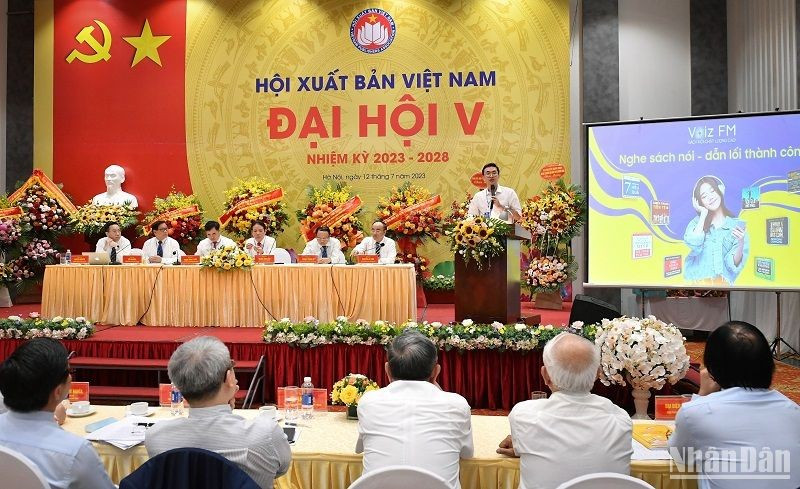Themed “Vietnam Publishing Association, innovation, integration and development”, the fifth Congress of the Association for the 2023-2028 tenure has been held in Hanoi to review its operation during the past tenure and devise tasks for the near future. The association also discussed measures to improve reading culture, the quality of the National Book Awards, the problem of counterfeit books and the digitalisation of the publishing industry.
Among the contents mentioned at the congress, the development of the audiobook genre has attracted much attention from publishing units and press agencies. Audiobook, a combination between traditional publishing and new technology, will become a driving force for pushing the industry towards adapting to digital transformation more quickly.
Potential market
Reporting on the activities of the Vietnam Publishing Association for the 7th tenure, the association’s Vice Chairman Hoang Phong Ha said that over the past five years, publishers and publishing affiliates have tried their best to grasp the modern development trend in the world and carefully study the needs of readers. New and hot books have been promoted on technology platforms and social networks and many new publishing methods have been launched, especially those associated with the distribution of audiobooks and short books.
In countries with a developed reading culture, audiobooks have been receiving a lot of public attention. This industry has gradually become a fast-growing business in the publishing sector.
According to the Audio Publishers Association (APA), global audiobook sales have grown sharply over the past ten years. It is estimated that the world's audiobook market will reach over 30 billion USD by 2030. This feedback proves that shifting from traditional to digital operations is the right direction for the publishing industry.
In Vietnam, e-books and audiobooks have also recorded impressive milestones over recent years. According to the Department of Publication, Printing and Distribution, there were 3,200 electronic publications released by 2022, attracting 15 million users. This is equivalent to 32-35 million copies of books read, an increase of 59% compared to 2021.
Grasping the changing tastes of the public, many publishers have built platforms and applications for books on the Internet. Readers can now access books and newspapers with integrated multimedia content. As a result, new publications and knowledge have been transmitted interestingly quickly.
Despite a strong breakthrough compared to other types, it should be frankly acknowledged that audiobooks currently account for only a small percentage of the publishing industry's market. This is still a market with strong potential, which needs a more methodical construction and exploitation plan.
Along with the changes in the methods of conveying content, the book market also needs to boldly embrace innovations in business. Currently, many audiobook publishers are doing business in two forms: selling by book and selling by packages of data and subscriptions.
In fact, many people are still afraid of using the model of selling by package because they have a long-standing habit of purchasing by physical book. This leads to limitations in providing and testing audiobook manufacturers' services to users.
For the sustainable development of audiobooks, publishers need to boldly embrace new things. Accurate understanding of the market size will help agencies and businesses make the right roadmap, especially in pricing copyrights and revenue expectations. At the same time, readers should also give more opportunities for new services to increase new experiences, contributing to preserving and developing reading culture.
Effectively taking advantage of AI to improve quality
Advances in information technology have facilitated the application of artificial intelligence (AI) in the publishing industry. Besides reading the text in the usual way, readers can experience the content by audio, images, and video. As a result, they can interact more with the work and understand more about the content and message of the book.
For audiobooks, technology plays an important role in conveying content, team management and platform operation. Some of the popular audiobook applications in the country are Waka, VoizFM, Fonos, and Reavol, etc.
Obviously, the biggest advantage of AI in audiobook production is speed. Not talking about quality, but just counting on quantity, in a day, AI can produce hundreds of audiobooks. However, quality is still a prerequisite for book publishing.
Up to now, many platforms have implemented AI into reading, something which has received many positive responses. VoizFM has also piloted AI voices in some short content such as the 30-second Summary category. However, both users and the manufacturing company are not satisfied with the results brought about by this activity.
Le Hoang Thach, Director of WeWe Technology Co., Ltd., owner of the VoizFM platform, said: “The sound goes straight to the soul. The voice of the reader must good enough to fully convey the emotions and contents of the book. AI has not been able to do this”.
 |
| Le Hoang Thach, Director of WeWe Technology Co., Ltd, delivers a presentation on audiobooks at the Congress. (Photo: THANH DAT) |
Currently, most of the contents on this application are still made by humans. Short and long stories and literary novels are the genres that account for the majority market share. These genres require the reader's voice to express diverse and authentic emotions. Audiobooks also do not have the support of images and readers cannot stop on the page to re-read sentences and words like in ordinary books.
To use AI effectively, audiobook publishers need to test and select carefully before putting AI features into action. AI can help audiobook publishers build an environment that connects directly with readers, increases interactivity, and builds a community that loves to listen to books online.
In addition, technological solutions will also contribute to solving two difficult problems of audiobook publishers including recording quality and content appraisal speed. This activity will help reduce time, avoid resources and money wasting for publishing units.
Stimulating the purchasing power of paper books using audiobooks
Not only directly increasing revenues for the publishing industry, audiobooks canalso indirectly bring benefits to this industry by stimulating the purchasing power of paper books and spreading reading culture to a wider range of users.
A survey from audiobook platform of Voiz FM shows that nearly 60% of the app's customers have purchased an additional paper copy of their favourite works.
Therefore, audiobooks can be considered a complementary array, improving the quality of experience, and supporting the development of paper books through the introduction of book products in the online space.
















